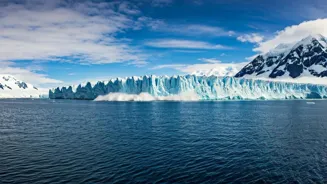Rapid Ice Decline
The Antarctic sea ice has been shrinking at an alarming pace, nearly twice as quickly as its Arctic counterpart, especially since 2014. This swift decline
reflects a dramatic shift in the region's environment. The extent of the sea ice coverage is crucial as it impacts Earth's climate system by reflecting sunlight back into space. A reduction in sea ice cover causes more solar radiation to be absorbed by the ocean, which further amplifies the warming trend. It's an accelerating cycle, wherein less ice results in more heat absorption, ultimately speeding up the melting process of ice sheets. Moreover, the shrinking sea ice also influences the habitats of various species that call Antarctica home, as they become more vulnerable to the shifting environmental conditions. The accelerated ice decline is a severe symptom of the broader climatic changes impacting Antarctica.
Ice Sheet Losses
The West Antarctic Ice Sheet, which is one of the world's largest bodies of ice, has experienced a concerning increase in ice loss. Since the 1990s, the pace of ice loss from the region has increased sixfold. This rapid acceleration has severe implications. The melting ice sheets contribute to a rise in global sea levels, threatening coastal regions worldwide. The West Antarctic Ice Sheet holds enough water to substantially raise sea levels if it were to completely melt, and the increased rate of loss is causing the effects of climate change to materialize sooner than anticipated. This situation further emphasizes the vulnerability of these icy regions and the need for urgent action. The dramatic sixfold increase in ice loss is a compelling indicator of the escalating climate crisis, underscoring the urgent need for understanding and addressing the issue.
Defining Abrupt Change
Scientists use the term "abrupt change" to describe climatic or environmental shifts that happen much faster than anticipated. This rapid pace of change is a critical concern. The swift transformation signifies that expected projections for the climate and environment are being outpaced. For instance, if the sea ice is declining at twice the projected rate, it means that environmental and ecological models are not accurate to real-world conditions. The use of 'abrupt' suggests that these transformations are not occurring at a gradual or steady pace. The rapid nature of these changes calls for immediate reassessment and potential adjustments in our understanding of climate models and strategies. It also highlights the importance of promptly adapting to changing environmental conditions to mitigate their most serious effects.
Ocean Current Impacts
Melting Antarctic ice is impacting the Antarctic Overturning Circulation (AOC), a vital element of the climate system. The AOC is a complex system of ocean currents playing a key role in regulating global climate. The influx of freshwater from melting ice sheets can disrupt the delicate balance of the AOC, potentially leading to shifts in ocean circulation patterns. These changes can trigger fluctuations in weather patterns across the globe, as ocean currents directly impact weather systems. Disruptions to the AOC may trigger alterations in the climate conditions in various regions, influencing their temperature, rainfall, and extreme weather events. The stability of the AOC is crucial for climate regulation, and the impact of Antarctic ice melt on it signifies the broader consequences of climate change on the world's oceanic systems.















